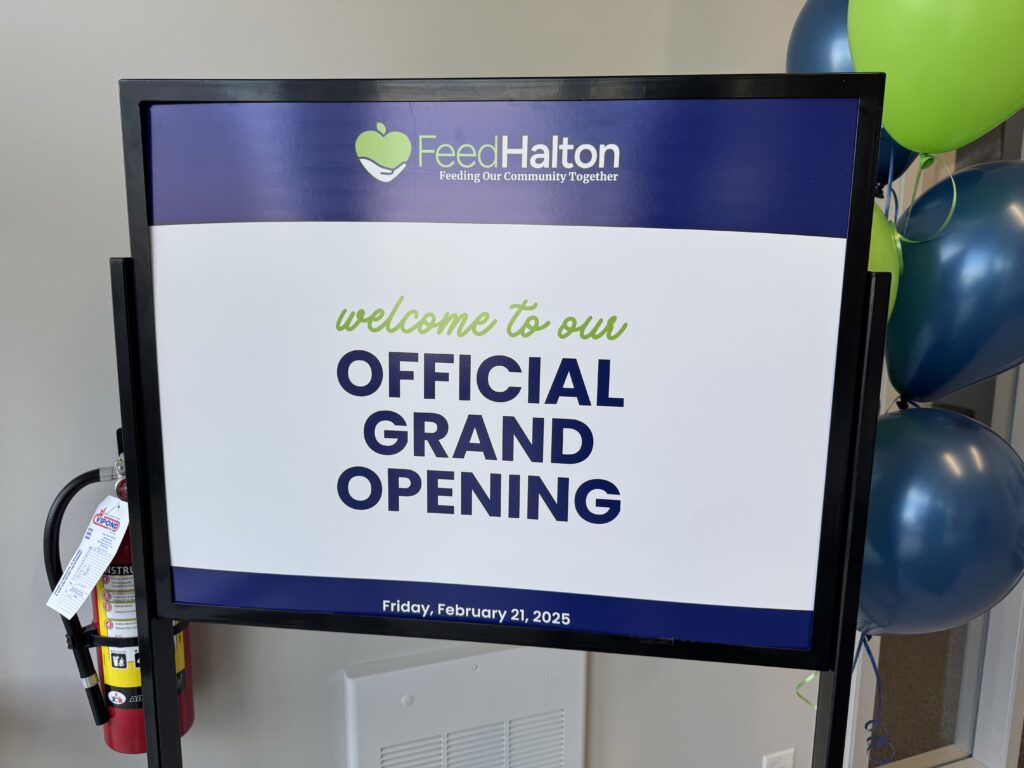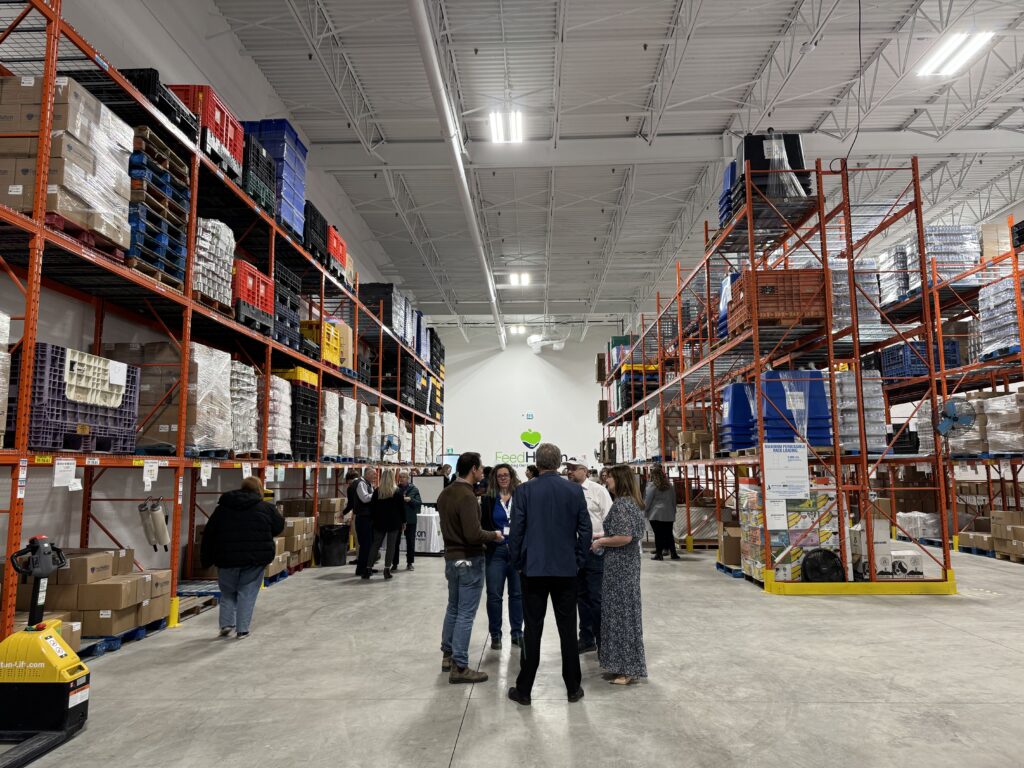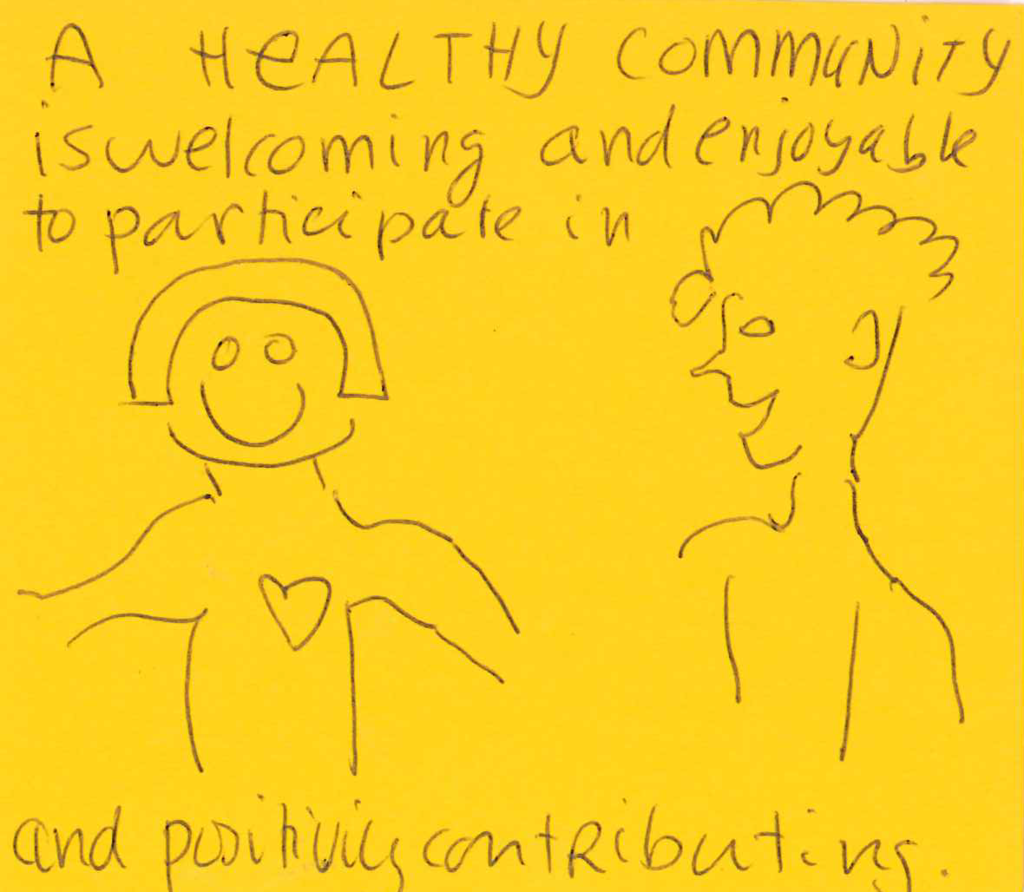By Jack Brittle, Local Journalism Initiative Reporter
On February 21, Feed Halton celebrated the official grand opening of their facility located at 5280 Mainway as well as their new charitable status, which was secured this month.
Krista Kay, director of marketing and community fundraising, acted as emcee for the event and introduced each speaker, who spoke about the importance of Feed Halton in the community,
In attendance were Burlington Mayor Marianne Meed Ward, ward councillors Shawna Stolte, Kelvin Galbraith, Angelo Bentivegna, and Paul Sharman, and Milton MP Adam van Koeverden, among others.
Indigenous leader White Eagle led attendees in an opening prayer and intention-setting and spoke about her own experience with food banks.
“When I came here to Burlington, I had no money,” White Eagle said. “I had nothing. So, I had to go to Burlington Food Bank once every two weeks. And they always treated me with love, care, and appreciation. They never turned me away and always gave more as a matter of fact. And I really do appreciate that.”

White Eagle also said that she helped the group learn more about the importance of food in Indigenous culture and how it connects to the land.
“It’s really important that people understand that it is not a right for anybody to eat, it is a need,” White Eagle said. “And governments need to learn this.”
She said that the creators and management of Feed Halton share this sentiment.
Maria Thornton, chair of the Feed Halton board, was the first up to speak. She spoke about the milestone that the grand opening represents.
“Today, we gather to celebrate the launch of Feed Halton, a pivotal moment in our community’s ongoing commitment to addressing food insecurity,” Thornton said. “This initiative represents not just a new chapter but a significant evolution of our collective efforts to ensure that no one in the Halton region goes hungry. Despite our collective efforts, the need has only grown.”
Thornton said that the Burlington Food Bank established a reserve fund to launch the hub project in 2020, setting aside $1.2 million to create what is now called Feed Halton.
“We hope it is more than just a distribution centre. It’s a unifying force bringing together food security organizations to collaborate, support one another, and amplify our current impact,” Thornton said.
Thornton also thanked Halton Region for a $500,000 grant, which was matched by a private community member. She also thanked the Church of Latter-Day Saints for a donation that enabled Feed Halton to purchase a truck for transporting food.
Van Koeverden spoke next, emphasizing the importance of other programs that help the less fortunate to go along with food banks.
“As we all know, food insecurity is not about not [having] enough food, it’s about poverty,” van Koeverden said. “So when we eliminate poverty, we can eliminate food insecurity. And one of the best ways to do that is to build more supportive housing and look into more non-market solutions for Canadians, and that’s one of the reasons I got involved in politics.”
Gary Carr, Halton’s regional chair, spoke next and talked about how long the fight to eradicate food banks has been ongoing.
“I was an MPP and an MP, and I thought back to when I was first elected in 1990,” Carr said. “One of the issues during that campaign and one of the promises was to eradicate food banks.”
Meed Ward spoke next and recalled when she and her team came to the building back when it was still under construction and sorted boxes.
“It was it was one of the most therapeutic, peaceful exercises that I have ever done,” Meed Ward said. “And it just felt so good to be lost in my thoughts and know that every packet of food that I’ve put in a box is going to help somebody and contribute to our community.”

Meed Ward said that between the cost of housing and healthy food, and including those living off of Ontario Disability Support Payments (ODSP), people in need spend between 40% to 141% of their income on food.
She encouraged voters to ask their candidates in the upcoming provincial election what their stance is on ODSP, a universal basic income, and food insecurity.
Meed Ward said that 15% of Halton residents are food insecure.
Carolyn Stewart, CEO of Feed Ontario spoke next and spoke about the unprecedented numbers of people reliant on food banks warranted a new model of distribution.
“We knew that traditional models and other ways of doing things were no longer going to be enough to address the demand for emergency food assistance in our communities,” Stewart said. “So really, that’s exactly where the idea of your Feed Halton came from.”
“A vision for something a lot bigger than a single food bank, something that could increase collaboration, really maximize resources and improve services to the entire region,” Steward continued. “And what stands before us, which is much different than the dirt floor that we saw when we first opened, is really an outcome of that idea.”
The last speaker was Robin Bailey, executive director of Feed Halton. Bailey spoke about how the collaborative approach allows food banks to work with each other’s strengths and doesn’t disparage any of the work they’re doing currently.
“This place is a game changer for this region,” Bailey said. “And I think it’s really important for us to understand that we’re not saying that the food banks that are already operating in this region aren’t doing a great job. They are stretched so thin and they’re doing everything they can possibly do.”
Sharman said that the new approach that Feed Halton brings to addressing food insecurity will help get more people the food they need.
“I think the critical issue is that at no point in the past has there been such a collaborative and integrated solution to gathering food and distributing it in a very well-organized way,” Sharman said.
He also spoke about the new opportunities that achieving charitable status will bring.
“It allows them to get funds and food from other people without it being taxable income,” Sharman said. “When you’re not for profit, people can’t give you anything without it being taxable in some way. As soon as you become charitable, you can just receive things. And so then the doors open.”





